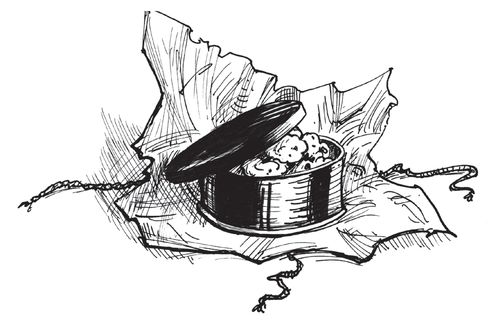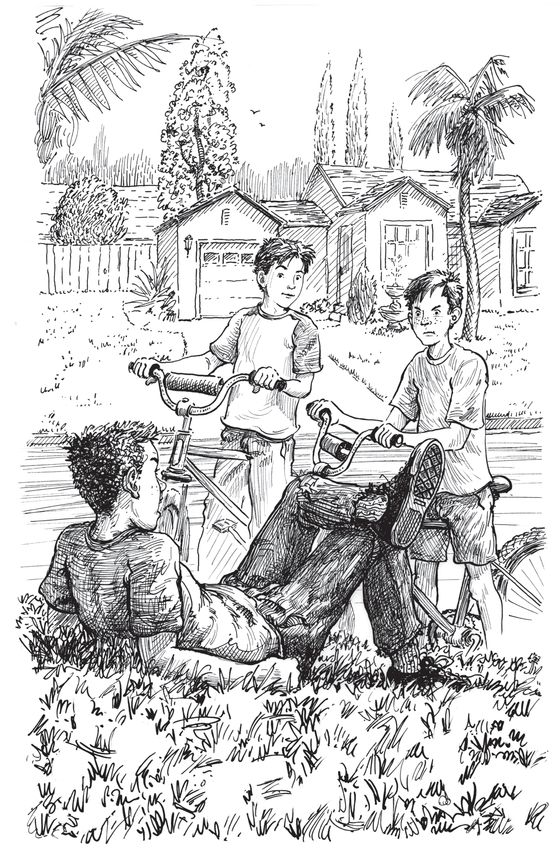Encyclopedia Brown and the Case of the Secret UFOs (3 page)
Read Encyclopedia Brown and the Case of the Secret UFOs Online
Authors: Donald J. Sobol

BOOK: Encyclopedia Brown and the Case of the Secret UFOs
9.14Mb size Format: txt, pdf, ePub
“There he is, officer!”
Bugs rolled his eyes at the policeman. “This just gets worse and worse.”
“You do make it sound pretty bad,” said Encyclopedia.
Bugs took a bag out of his pocket. “I've even got pieces of the two eggshells as evidence.”
“This is a pretty serious charge,” said the policeman.
“Caught in the act by an eyewitness!” Bugs howled triumphantly. “Do you have anything to say in your defense?”
“I have eggsactly one thing to say,” said Encyclopedia. “I'm innocent.”
Â
HOW DID ENCYCLOPEDIA PROVE IT?
Â
(Turn to page 77 for the solution to “The Case of the Scrambled Eggs.”)
The Case of the Roman Pots

“Is this the Brown Detective Agency?” a girl asked, entering the Browns' garage.
“It is,” said Encyclopedia. “And you're Julie Benson. I saw your picture in the newspaper last year. You found those arrowheads up by Indian Point. As I recall, you were able to date them as being over two hundred years old.”
Julie smiled. “You remember quite a bit. I heard you had a good memory.” She took out a quarter and placed it on the gasoline can. “I need your help. I'm still very interested in archaeology. I want to collect old things, not just arrowheads, but things from all over the world.”
“That's a great hobby for a fourth grader,” Sally remarked.
“I'm always on the lookout for a chance to add to my collection,” Julie said. “There's a boy at the high school, Gus Anthony, who put up signs saying that he will be selling ancient Roman pots. I don't think I'll be getting to Rome any time soon, so I'd love to buy one. The thing is, I don't know much about ancient Rome. I figure you know.”
“I've read a little,” said Encyclopedia. “When is the sale?”
“This morning,” said Julie.
“Then let's go,” Sally said. “With luck, we'll be able to figure out if Gus is a crack-pot or not.”
Gus Anthony had set up shop in his back-yard. Over one shoulder he wore a sheet, which was tied with a rope around his middle.
Encyclopedia, Julie, and Sally joined the other kids who had come for the sale.
Sally giggled. “Why is he wearing that outfit?” she whispered.
“It's supposed to be a toga,” Encyclopedia explained. “It was a comfortable form of Roman clothing. I think Gus is trying to build the proper mood. He's wearing a laurel wreath on his head, another Roman tradition. It was kind of their version of a hat.”
Gus bowed to the crowd of children. “Thank you all for coming to this special sale. Julius Caesar, the great Roman general, was famous for saying:
Veni, Vidi, Vici.
That's Latin. Translated into English, it means:
I came, I saw, I conquered
. Today, I hope that some of you will end up saying:
I came, I saw, I bought some pots
.”
Veni, Vidi, Vici.
That's Latin. Translated into English, it means:
I came, I saw, I conquered
. Today, I hope that some of you will end up saying:
I came, I saw, I bought some pots
.”
He pointed to the table in front of him. Several pots of different sizes were on display. They were blackish-brown in color and irregular in shape. They certainly looked made by hand.
“See how the glazing is worn?” said Julie. “And the edges are chipped. You'd expect that on pots people used two thousand years ago.”
“These pots,” Gus said, “served a number of purposes. The tall one might have held wine. The short, fat one with the lid could have held honey. The small ones would have been used for spices. The Roman Empire spread over thousands of miles, and the people of Rome were able to buy things from all over the known world.”
The kids looked impressed.
“Of course,” said Gus, “it's not enough that the pots are old. Just being old, after all, covers a lot of ground. The pots are more valuable when they're dated. Now you have to remember that the ancient Romans did not use the same numbers that we do. We use the Arabic number system. They used their own system, which we call Roman numerals.” He lifted one pot to show everyone the bottom. “You can see this one is dated XXIII B.C. XXIII means twenty-three.”
“That's over two thousand years ago,” said a boy in the front row.
“Right you are, kid,” said Gus. “Which is very old by anyone's standards. That's the reason the pots are expensive. They'd cost a lot more if you had to buy them in a store. They're pretty delicate. Look, but don't touch.”
“What do you think?” Julie asked Encyclopedia. “He certainly sounds like he knows what he's talking about.”
“It might have helped if he had known a little less,” said Encyclopedia. “Rome wasn't built in a day, and none of these pots were around when it was.”
Â
HOW DID ENCYCLOPEDIA KNOW?
Â
Â
Â
(Turn to page 78 for the solution to “The Case of the Roman Pots.”)
The Case of Grandma's Cookies

Ziggy Ketcham was the most absentminded boy in Idaville. Everyone knew that. Even Ziggy had known that before he had forgotten it.
Right now he was trying to remember what had brought him to Encyclopedia Brown's house in such a hurry. He knew he had been in a hurry because he was out of breath from running. He just didn't remember why he was in such a hurry.
“Can I help you, Ziggy?” asked Encyclopedia. He had been watching his friend standing outside his garage for a while. Encyclopedia knew Ziggy well enough to know that when Ziggy stood around like that, it meant he had forgotten something he was trying to remember. Encyclopedia also knew that Ziggy liked to remember things for himself. However, sometimes he needed a little help.
“I know I came here for a reason,” said Ziggy. “It's not an accident. I wanted to hire you, I think. That's why I'm holding this quarter.”
He came forward and put it on the gasoline can.
“That's a start,” said Encyclopedia. “There's no extra charge for helping you remember why you wanted me to help you in the first place. It's all part of the service.”
Ziggy looked relieved. “Thanks, Encyclopedia. Where do we start?”
Encyclopedia thought for a moment. “Don't worry about remembering everything at once. We'll chip away one memory at a time.”
“Chip!” Ziggy shouted. “That's it. I remember now. You're brilliant, Encyclopedia. I came here to get you to help me get back some stolen cookies. Chocolate chip cookies. My favorite kind. My grandmother sent them to me from California. Nobody makes better chocolate chip cookies.”
“How did you lose them?” asked Encyclopedia.
Ziggy closed his eyes. “The cookies came in the mail today. They were sealed in a metal tin. I ate a couple right awayâthey were as good as everâand then I closed up the tin to save the rest for later.”
“And?” asked Encyclopedia.
“And what?” said Ziggy.
Encyclopedia smiled. “I think you were starting to tell me how your cookies were stolen. But we haven't gotten to the stolen part. What happened next?”
“Oh, right. Let me see . . .” Ziggy scratched his head. “I was sitting on my front steps. The tin was on the step beside me. Then Rocky Graham came by on his bike.”
Encyclopedia nodded. Rocky Graham was a member of the gang of tough boys, the Tigers.
“What happened next?” Encyclopedia asked.
“Rocky saw me with the tin,” Ziggy said. “He asked me what was inside it. I told him cookies. Then he asked me if he could have a glass of water. I went inside and got it. When I came back out, he drank the water and went on his way.” Ziggy frowned. “It was only after he was gone that I realized the tin was gone, too.”
“Are you sure you didn't bring it into the house when you went to get Rocky his drink?”
“I thought of that,” Ziggy answered. “I've looked everywhere to be sure. The tin is gone. I haven't been anywhere else, except to come here.”

“Well, well,” Rocky sneered, “if it isn't Mr. I-forget and Mr. Know-it-all.”
“Did you talk to anyone else about the cookies?” Encyclopedia asked.
Ziggy shook his head. “He was the only one.”
Encyclopedia nodded. “Then I think we should go pay Rocky a visit.”
They found Rocky lying on his front lawn, chewing on a blade of grass.
“Well, well,” Rocky sneered, “if it isn't Mr. I-forget and Mr. Know-it-all. To what do I owe the pleasure of your company?”
“We're investigating a crime,” said Encyclopedia.
“You took my cookies!” Ziggy blurted out. “I want them back.”
“Me?” Rocky looked shocked. “I know I may have done a few things in the past. That doesn't mean I'm guilty of anything now.”
“Oh, yes, it does,” Ziggy insisted.
Rocky laughed. “Listen, Amnesia Boy, you wouldn't remember your own name if your mother hadn't sewn it in your underwear. So how could you remember anything I might have done?”
Ziggy reddened. “Why, youâ”
Encyclopedia put his hand on Ziggy's shoulder to calm him down. “You'll have to forgive my friend,” Encyclopedia told Rocky. “As you can see, he's pretty upset. Who wouldn't be? The missing cookies are his favorites. His grandmother sent them.”
“Sure,” said Rocky. “I've got a grandmother, too.”
“Of course you do,” said Encyclopedia. “Now, I'm not accusing you of anything. Since Ziggy mentioned that you had passed by his house, I was hoping you might have seen something.”
“You mean like a witness?” Rocky asked.
“Exactly,” said Encyclopedia. “Some kind of clue that will point us in the right direction.”
Rocky grinned. “No problem. I want to help. Now that you mention it, I did see a kid hanging around. Nobody I recognized though. He might have taken your tin. He looked kind of suspicious. I think he headed off toward the beach.”
“Can you give us a description?” Encyclopedia asked.
“Well, I wasn't paying close attention. Tall and skinny, maybe, with brown hair.”
“Wow,” said Ziggy. “That's really nice of you to help like that. I'm sorry I yelled at you before.”
“Forget it,” said Rocky. “I just hope you can find the kid before it's too lateâand all your chocolate chip cookies are gone. “
Encyclopedia turned to Ziggy. “You see,” he said. “I knew Rocky would help us.” He turned back to Rocky. “Now I know you took the cookies. I just hope you didn't eat them all yet.”
Â
WHAT WAS ROCKY'S MISTAKE?
Â
(Turn to page 79 for the solution to “The Case of Grandma's Cookies.”)
The Case of the Grabbed Groceries

Other books
Father and Son by Larry Brown
The Oneiro Rangers: First Night by Erwin Blackthorn
Star Style by Sienna Mercer
The Coffin Quilt by Ann Rinaldi
The Tapestries by Kien Nguyen
Across a Moonlit Sea by Marsha Canham
Raising The Stones by Tepper, Sheri S.
His Wicked Wish by Olivia Drake
Letter to My Daughter by George Bishop
Beautiful Distraction by J.C. Reed